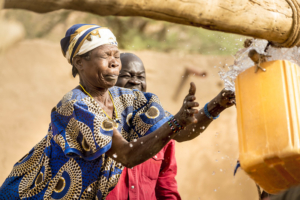Empowering Women Farmers in Mali
 In the arid lands of Mali, where poverty has been a longstanding adversary, a glimmer of hope is emerging through the empowerment of women farmers. The significance of this endeavor cannot be overstated, as it addresses not only the immediate challenges faced by these women but also strikes at the very heart of fighting poverty in the region. By empowering women farmers in Mali, the nation is unlocking a potential that holds the key to economic transformation and a brighter future for its rural communities.
In the arid lands of Mali, where poverty has been a longstanding adversary, a glimmer of hope is emerging through the empowerment of women farmers. The significance of this endeavor cannot be overstated, as it addresses not only the immediate challenges faced by these women but also strikes at the very heart of fighting poverty in the region. By empowering women farmers in Mali, the nation is unlocking a potential that holds the key to economic transformation and a brighter future for its rural communities.
Poverty’s Grip on Rural Communities
Mali, like many other African countries, grapples with deep-rooted poverty that disproportionately affects its rural population. In fact, 49% of Malians live below the extreme poverty line. In the face of climate change, volatile food prices and limited access to resources and education, women farmers often find themselves trapped in a cycle of hardship and marginalization. However, recent initiatives aimed at empowering women in the agricultural sector are showing promise in breaking these barriers and creating opportunities for sustainable development.
Unity in Empowerment: Women’s Farming Cooperatives
One such initiative gaining momentum is the establishment of women-led farming cooperatives in Mali. These cooperatives provide a platform for women farmers to come together, share knowledge, pool resources and collectively market their produce. By working together, these women gain access to larger markets and better crop prices, improving their income and financial independence. Additionally, these cooperatives foster an environment of mutual support, enabling women to adopt innovative and sustainable farming practices that enhance crop yields and resilience in the face of environmental challenges.
Education as a Catalyst for Change
Furthermore, addressing the gender gap in access to education is another critical component of empowering women farmers in Mali. When women attain knowledge and skills, they become powerful agents of change within their communities. Non-governmental organizations and local authorities are partnering to establish training programs that focus on agricultural techniques, financial literacy and leadership skills. These programs not only enhance women’s capabilities but also contribute to the overall agricultural productivity of the nation.
Policy Shifts Towards Inclusivity
In recent years, the Malian government, in collaboration with international development agencies, has also taken significant steps to address the systemic challenges women farmers face. By providing better access to land tenure, credit facilities and agricultural extension services, the government aims to level the playing field and create an enabling environment for women to thrive in agriculture. Additionally, policies that promote gender equality and women’s rights are being integrated into national development plans, signaling a commitment to sustainable and inclusive growth.
Empowerment Transforms Lives
The impact of empowering women farmers in Mali is already evident. These women are lifting themselves out of poverty, and their families and communities are also experiencing positive transformations. Increased income levels enable better access to health care, education and improved living conditions. Moreover, the newfound recognition of women’s contributions is challenging traditional gender norms and fostering a more equitable society.
Looking Ahead
The empowerment of women farmers is igniting a transformative shift in Mali. As women-led cooperatives thrive, their collective strength is breaking the cycle of poverty while fostering resilience against challenges. Education and policy shifts are further nurturing this progress, creating a ripple effect that not only improves lives but also cultivates a more inclusive and equitable society for Mali’s rural communities.
– Valentin Lyazov
Photo: Wikipedia Commons
